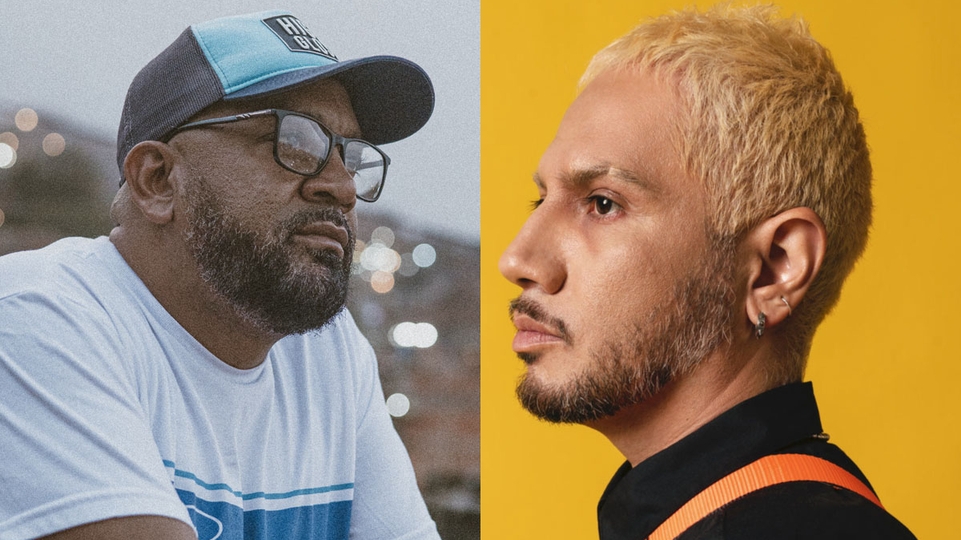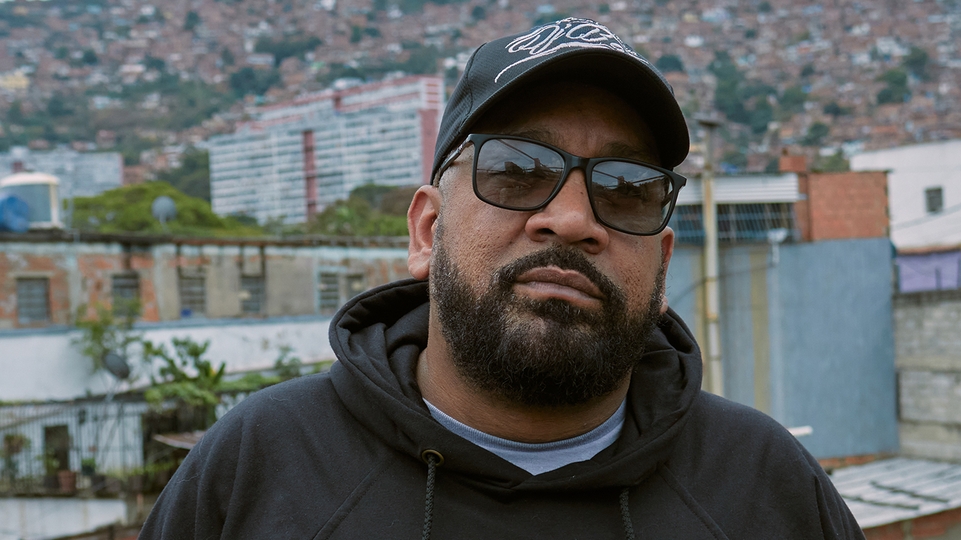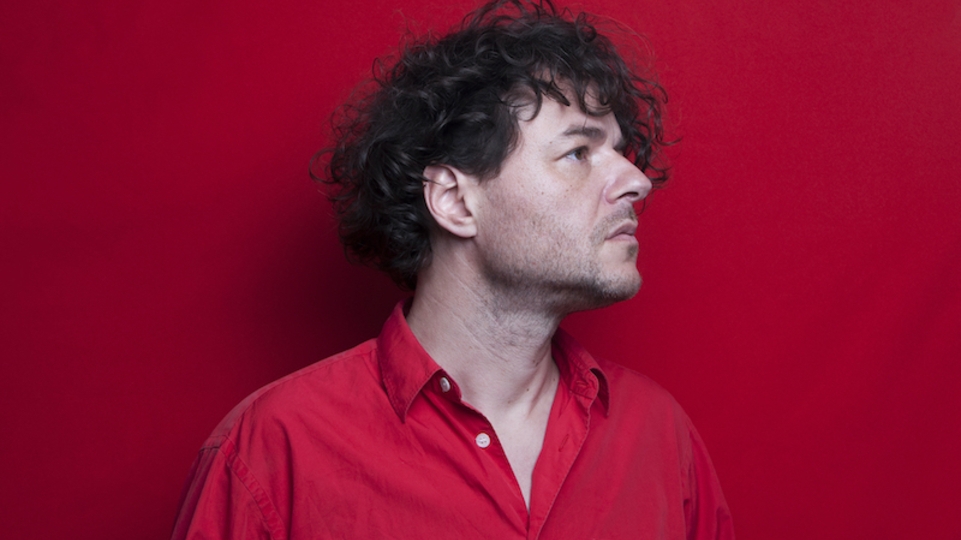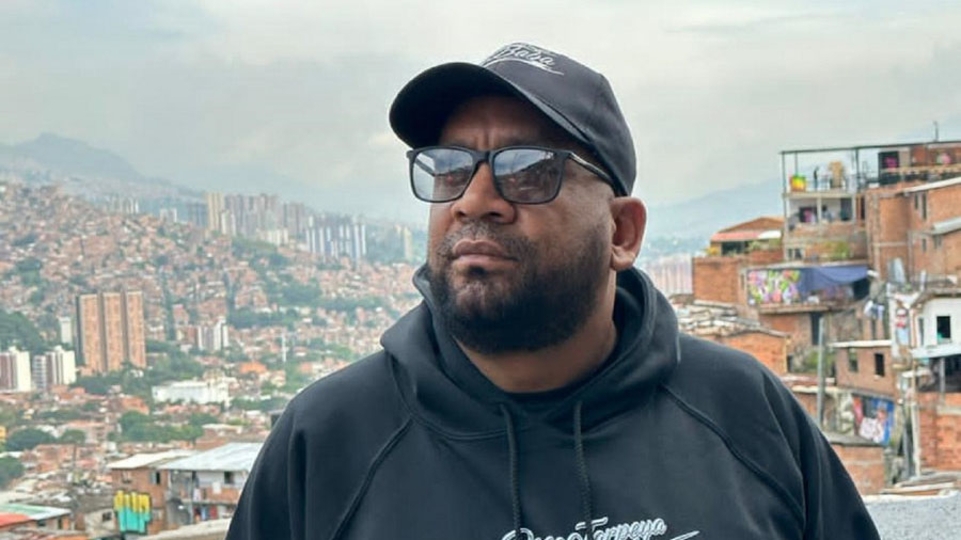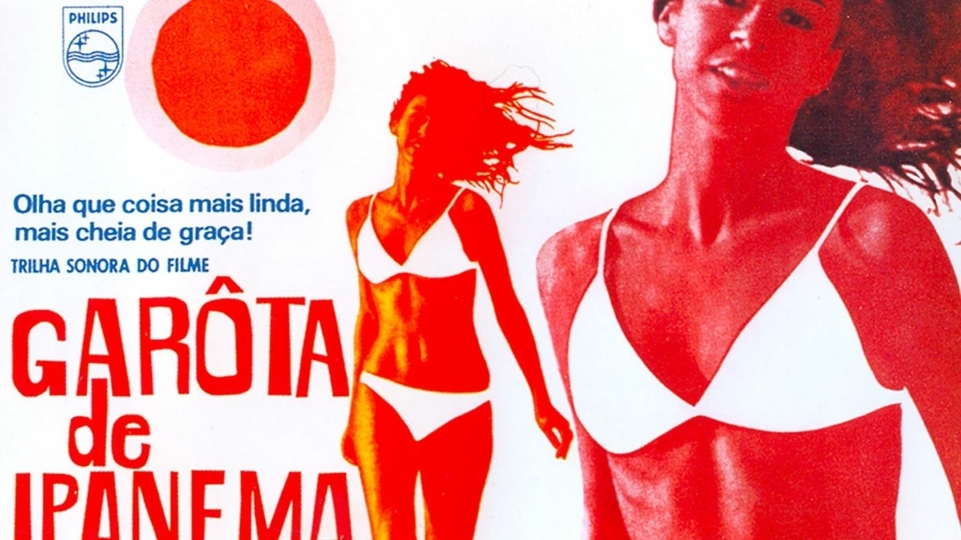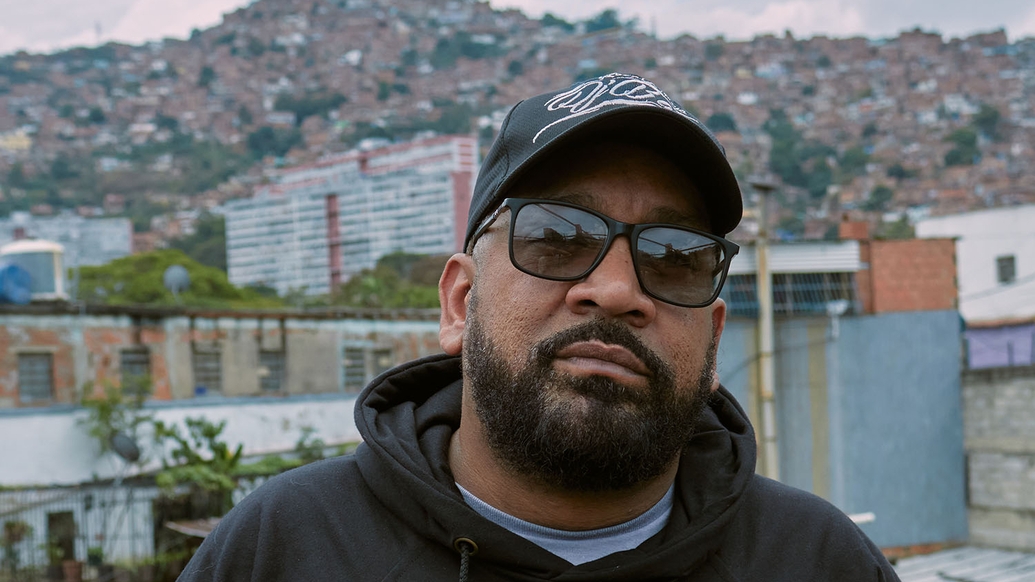
DJ Babatr: the roar of raptor house
In the late ‘90s and early ‘00s, a new sound erupted from the barrios of Venezuela's capital city. Propulsive, colourful and chaotic, this was raptor house. Pedro Elias Corro, aka DJ Babatr, was its creator. Two decades later, he is at last receiving his flowers on a global scale. Alongside a fiery On Cue mix demonstrating his sound, he speaks to E.R. Pulgar about the street parties where the sound took root, the violence and racism that marred its evolution, and bringing raptor house to world
August 21st, 2005: a crowd of young Venezuelans fills the Parque Naciones Unidas, a sports complex near the barrios on the west side of Caracas. They are euphoric, ready to dance. The venue, home turf of the Cocodrilos de Caracas basketball club, is hosting a party in celebration of another reptilian figure. In a grainy, archival video, the event’s MC can be heard introducing the man of the hour in Spanish: “This is the creator, the leader of a sound that’s going to revolutionise not just Venezuela, but the world. His name is Pedro Elias — know him.”
The sound is raptor house. Its progenitor, Pedro Elias Corro, has gone by several names over the years — Baba the Raptor, DJ Baba TR, DJ Baba. The one that’s stuck is a portmanteau: DJ Babatr.
The footage he shows us now, 18 years later, documents the genre’s first official anniversary celebrations, when young people came from all over Caracas to dance at this now-legendary matiné. These mid-day raves are where raptor house — described by Corro as “a tropical Latin reinterpretation of techno” — took root. It is now widely considered to be the first electronic music genre to come out of Venezuela.
DJ Babatr remains the genre’s driving force to this day. After two decades, the raptor house don — who is still based in Venezuela — is at long last getting his flowers. In 2022, Corro featured on Miami-based producer Nick León’s ubiquitous festival hit, ‘Xtasis’ on TraTraTrax, which DJ Mag named as one of its tracks of the year. At the start of this year, he released his debut vinyl EP, ‘The Tribe (Baila)’ via the sonidoaca label. Earlier this summer, two of his classic tracks — ‘Las Lomas’ and ‘Fuma Con Los Panas’ — were reissued and remixed by 19 formidable names on the global electronic scene, including Madrid’s Merca Bae, São Paulo’s BADSISTA, Hyperdub founder Kode9, and fellow Venezuelan producer Safety Trance (AKA Cardopusher). Getting to this point was hard-fought, and behind this newfound sheen there’s a story of a genre that was born from — and made for — the streets.
Corro shows us the videos from the Parque Naciones Unidas with a lot of pride. It was, he tells DJ Mag, the first time all the barrios on the west side of the city — a marginalised and economically vulnerable area inhabited predominantly by Black and darker-skinned Venezuelans — had gathered amicably to dance. Amid neighbourhood feuds and increasing political turmoil in Venezuela, these young partygoers assembled to sweat their troubles out.

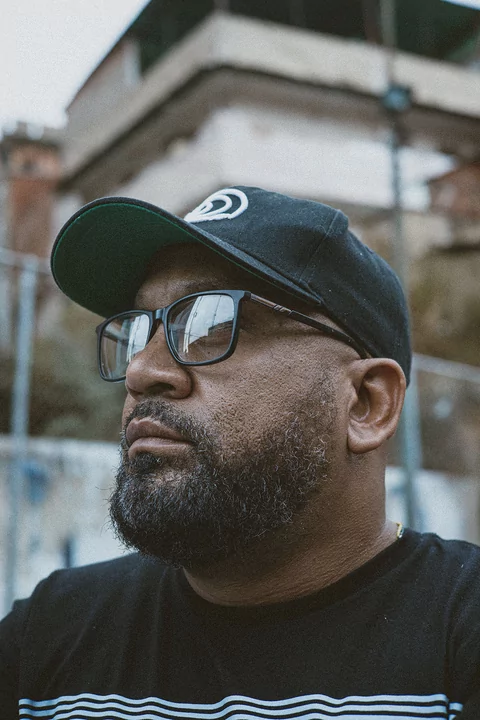
“Raptor house, without a doubt, is rebellion — it’s energy. Raptor house is a lost child of techno.”
Prior to this, raptor house rumbled in the underground. Its history is hard to pin down, communicated through word-of-mouth and distributed by hand via cassettes, boldly-coloured party flyers, and pirated mix CDs sold near the turntables at certain parties, in neighbourhood shops, and on the street by buhoneros [wandering salespeople].
Its origins date back to the matinés of the late ‘90s, which were powered by mobile sound systems called minitecas. Developed in affluent neighbourhoods in east Caracas, these roving stereos played salsa, merengue and changa (the term Venezuelans at the time used for European house music). The new sound that grew out of this combination matched the vibe of its natal city: chaotic, colourful, and Caribbean to its core.
Mix the velocity of tribal house and techno with samples lifted from ‘90s radio and a distinctly Afro-Caribbean flow, and you’ll end up with something close to the fast-paced heart of raptor house. “Raptor house, without a doubt, is rebellion — it’s energy,” says Corro. “Raptor house is a lost child of techno.”
“I grew up listening to Belgian electronic music, acid house, techno… O sea, I’m a child of the ‘90s,” he continues. “It cannot be denied that I have Anglo roots in my sound, but I’m also Latino and I’m also Venezuelan. We have an undeniable percussion that is so particular, and I have the honour of having this run in my blood and being able to fuse it with these influences.”

Corro grew up on Block 11 in Propatria, a Black boy from a rough neighbourhood on Caracas’ westernmost end. He listened to electronic music on the radio, marked especially by Technotronic’s ‘Pump Up The Jam’, and began collecting vinyl and cassettes in 1988 when he was 13. Scrounging his lunch money and running errands to buy music, he eventually learned how to mix, and soon began spinning at local minitecas and producing his own tracks.
Against the backdrop of a society that was, at the time, largely about salsa and merengue, Corro became known locally in 2001 for ‘Las Lomas’, a track he produced in tribute to the rooftop parties of the Lomas de Urdaneta building complex in the nearby neighbourhood of Catia. The cut, with its hard-pounding bass and ecstatic midpoint propelled by high-pitched keys, exemplifies the energy that came to define raptor house.
Meanwhile, on the east side of Caracas, in the barrio of Petare, another young DJ named Yirvin was developing an electronic style in the vein of raptor house called “hard fusion”. He and Corro caught wind of each other, eventually joining forces with other young creatives from Caracas’ barrios. Together with a formidable squad including DJ Deep, DJ Armando, DJ Linares, DJ Elieser, and DJ Byakko, The Raptor Crew was born.
Together, they paid homage to life in the barrios and at the matiné, documenting and creating a youth movement with tracks like ‘Cotiza’, ‘Mariguana (Pa’ que baila, pa’ que goze)’, ‘Dale Que No Le Has Dado’ and ‘Pan Con Mortadela’.
Raptor house developed alongside a number of genres like hard fusion: tuki bass, town house, street house, street tech, and others. These definitions were never clear-cut, and it became increasingly hard to see that most of these sounds had branched out from Corro’s own. Chalk it up to the genre’s staples — samples, high BPMs, driving bass — blurring with the others’, and a lack of an official record; information moved largely as underground oral history.
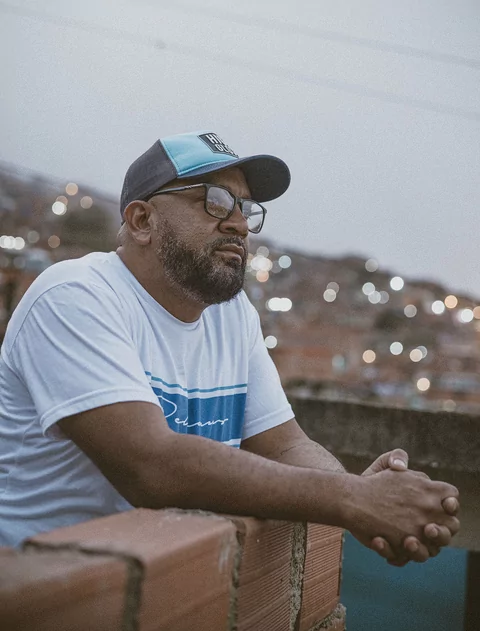

More confusing than pinning down Corro’s multiple DJ names is charting the actual documented history of raptor house. Tracks were distributed in a disorganised manner, mostly through pirated compilations on burnt CDs sold through local shops in the barrio or by buhoneros. As mixes were disseminated through the underground, crediting the correct DJ became near-impossible, and narrowing down specific sub-genres even moreso. One such mix, put out by DJ Byakko, was distributed under the name Changa Tuki. The term stuck, and came to encompass not just raptor house, but all the underground club music coming out of Caracas’ barrios.
“[Raptor house] used to be called changa tuki because that’s what it was being called in the late ‘90s and early 2000s,” explains Crack Magazine deputy editor, NTS curator, and Venezuelan-American writer Rachel Grace Almeida, who has written extensively about this electronic movement. “Sifrinos [snobby, upper-class people, mostly from the east side of Caracas] were calling people from the barrio — the people making changa and raptor house — ‘tukis’ as a derogatory term, a classist slur toward people in the movement. [Using the term] isn’t so much a rebrand as it is a repositioning.”
The way changa tuki was spelled mutated in the mouths of the young people who were a part of the scene: tuki became tukky became tuky. Corro maintains reservations about changa tuki’s use as an umbrella term though, considering the way it was used to marginalise the scene. No matter what you called the infectious caraqueño strain of electronica, the subculture blossomed. More DJs took to the decks (like the formidable DJ Adonis, famous in the scene for his samples), more matinés sprung up, and dance battles broke out between neon-clad tuki dancers — some achieving a reputation, like Elberth “El Maestro” — vying to out-swagger each other to the tune of an over-caffeinated BPM.
However, the scene became marred by fights, which broke out often after matinés. These outbreaks sometimes proved fatal, giving a bad reputation to the entire movement. News of these instances — fomented by the racism and classism that was so deeply rooted in Caracas’ society — cast a dark shadow on the genre. By the time Hugo Chávez’s populist government passed a law targeting the matinés, the whole affair had become increasingly bitter. Upper and middle class people already grossly wrote off kids from the barrios, especially those involved in the matinés. With the day rave’s legal status in hot water, and tuki becoming a synonym to malandro (a Venezuelan colloquialism for “delinquent”), the founders of the scene splintered off.
Corro, often on the receiving end of that classism and anti-Blackness, was exhausted. He stopped making music altogether in 2008, feeling unappreciated and guilty that the scene he helped build was ruined by violence. “Raptor house was a rebellion against how inaccessible the record stores were, how inaccessible the artistic medium of Venezuelan electronic music was for us,” he says now. “When we would spin, they would say it was ‘too Black, too niche, too marginal’. We were denigrated. I suffered this pretty particularly.”
.jpg86c7.webp)
“The idea is for people to keep dancing. I never wanted violence — I wanted people to come together and dance. That will always be my intention.”
In 2013, Corro and DJ Yirvin participated in a documentary, ¿Quién Quiere Tuki?, produced by local artists Pocz and Pacheco. At the same time, Corro had started uploading tracks from his extensive raptor house back catalogue on Bandcamp. Although the documentary helped ignite a new interest in raptor house abroad, the temperature at home remained polarised.
“It was hard because people would say, ‘Oh, here comes that loquito with his pum, pum, pum, pum, pum,‘” Corro says. “It’s still a process: with all the homophobia and classicism and all the things Venezuelans misunderstand, how the hell can you open yourself to the world? As a country, we’re in a pretty bad cultural retrograde. We hold ourselves back. Not everyone here has had the chances I’ve had, though. For a festival to get you out of the ghetto like that is something by the hand of God.”
Corro’s labours have now, at last, borne real fruit on foreign soil. 18 years to the day after raptor house’s anniversary matiné at Parque Naciones Unidas, he commenced a brand new monthly residency on NTS Radio. He also spent last month in Spain, playing a packed Boiler Room session in Barcelona for Primavera Sound in collaboration with Cupra. Frothy raptor house beats lifted up the crowd, entwined with modern samples, including the sexy vocoder drawl of fellow Venezuelan artist Arca’s ‘Mequetrefe’. While in Spain, Corro spent time with her, his home country’s most prominent musician at an international scale.
The darkness of the club has historically served as a refuge for those on the societal margins. For Black, Brown, queer, trans, and economically-precarious people surviving under the heel of patriarchy, homophobia, poverty, and racism, what is there to do but dance on the ashes of the end of the world, to summon a new tomorrow with our exhausted bodies? Corro notes that a Black man and a trans woman are now at the forefront of bringing Venezuela to global renown in electronic music. Their being embraced abroad stands in sharp contrast with the resistance they have found in their native country. Arca, once active in Caracas' indie scene as Nuuro, has yet to play a show in Venezuela post-transition (though she has expressed the desire to do so).
“I always thought: ‘If it's not today, it’ll be tomorrow’,” says Corro of his own situation. “I didn’t make this music thinking I could commercialise it — all I wanted to do was leave something behind, and I found that I had thousands of followers worldwide that I didn’t even know existed.”
With raptor house now finding its international audience, Corro sees a chance to not just vindicate the movement’s reputation, but to set the record straight on its origins. Whether Venezuelans at large continue to lift their noses at this genre is beside the point: the underground has always prospered, hidden from the gaze of the elite.
Despite the violence that damaged its reputation, and the various names that have been confusingly or malignantly thrust upon it, this scene was born out of the need for under-privileged people to live exultantly, to forget their troubles for a night or an afternoon, to alleviate the lightning rod of stress in their bodies with music as frenetic as their day-to-day. Venezuelan writers Juan Pedro Cámara and Jesús Torrivilla put it best in their 2015 book El Bravo Tuky: “Tuki is the architecture of peace.”
“The idea is for people to keep dancing,” says Corro. “I never wanted violence — I wanted people to come together and dance. That will always be my intention.”
Listen to DJ Babatr's On Cue mix below.
This interview has been translated, condensed, and edited for clarity.
Tracklist:
DJ Babatr, DJ Yoiser ‘Fuma Con Los Panas (Badsista Rmx)’
DJ Babatr ‘La Pista’
DJ Deep Rh ‘Radical Evolution’
DJ Babatr ‘The Journey’
TSVI ‘Matter Horn’
Chico Blanco ‘Enamorado (DJ Babatr remix)’
DJ Babatr ‘Oreimi’
Nick León ‘Xtasis (Dj Baba remix)’
Dj Deep Rh ‘Street House’
Mathias Aguayo ‘Camaron (Dj Babatr Remix)’
Dj Armando ‘Take Me Away’
Master at Work ‘Work (Dj Babatr Rapacious mix)’
DJ Babatr ‘Factory (back to me)’
DJ Babatr, Dj Deep Rh ‘Feel The Energy’
DJ Babatr ‘Infections’
LFO ‘LFO (Dj Babatr Reborn mix)’
